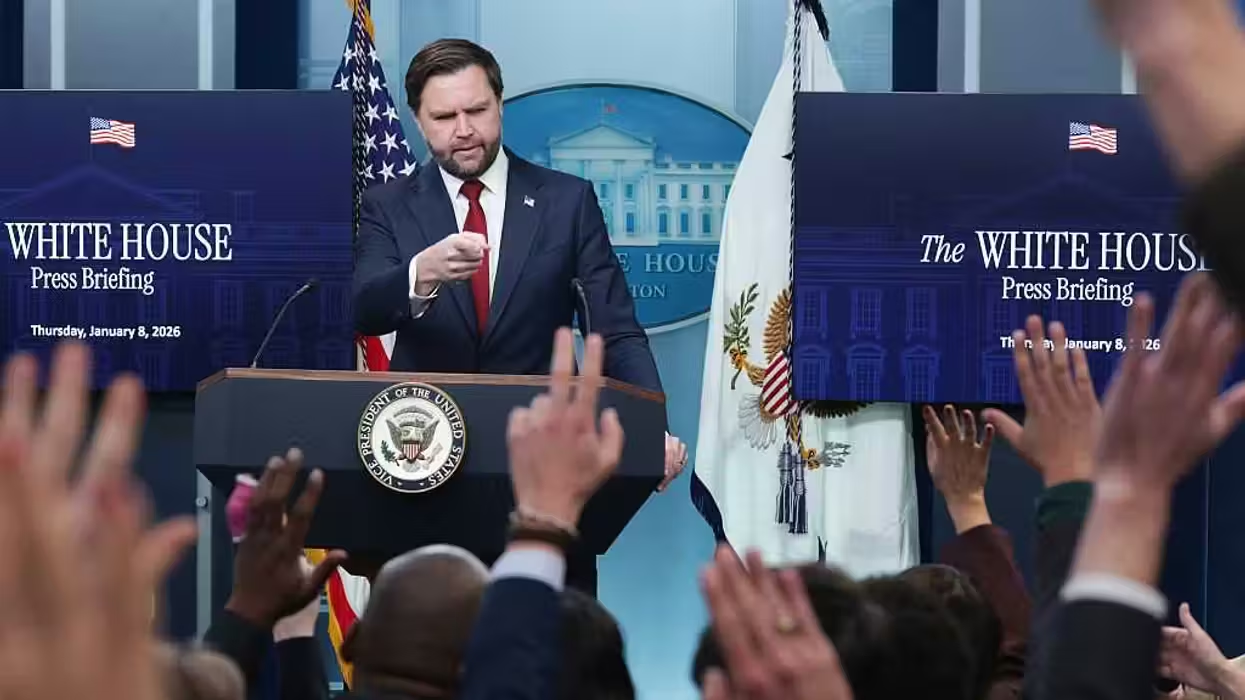
© 2026 Blaze Media LLC. All rights reserved.
Did Republicans really help Harry Reid confirm Obama's nominees on Saturday?
December 15, 2014
Senate Democrats have spent the last few days arguing that the Republican push for a vote against President Barack Obama's executive action on immigration actually helped Democrats confirm several of Obama's nominations.
But comments from Senate Majority Leader Harry Reid (D-Nev.) on Monday morning shows that Democrats were always planning on approving a last wave of Obama nominations before leaving. A basic understanding of current Senate rules also shows that Democrats have the power to approve these nominations whenever they want, without Republican help, because of changes Democrats engineered in the Senate.
 Sen. Harry Reid (D-Nev.) moved several nominations over the weekend, and some Democrats were saying Republicans allowed them to do so.
Sen. Harry Reid (D-Nev.) moved several nominations over the weekend, and some Democrats were saying Republicans allowed them to do so.
Image: Bloomberg/Bloomberg via Getty Images
The fingerpointing started late Friday, when Sen. Mike Lee (R-Utah) refused to agree to adjourn the Senate for the weekend. Lee was pushing for a vote to defund Obama's immigration action, along with Sen. Ted Cruz (R-Texas) and others.
That forced the Senate to return to work Saturday, and while the two sides were negotiating how to get around GOP objections, Senate Democrats scheduled a series of votes to confirm several of Obama's nominees, and to set up votes on several others this week.
By Saturday night, some Democrats were crowing that the GOP's actions gave the Senate the time to confirm more nominees. "Because of Senator Cruz's actions and Republicans' inability to stop him, Democrats will end up confirming more nominees by the end of this Congress than we would have been able to otherwise – including several key executive branch nominees and up to 12 of President Obama's judicial nominees," Reid spokesman Adam Jentleson wrote in a Saturday email.
But an earlier email from Jentleson admitted that Reid was always planning to hold these votes. "Senator Reid has been clear for weeks if not months that he plans to hold confirmation votes on a significant number of major nominees before this Congress adjourns," he wrote.
Reid's own comments Monday morning indicated that despite the work the Senate was able to do on Saturday, there is still more work to be done and he even threatened more work this coming weekend if it's needed. Those comments are another sign that Democrats always intended to push the nominations through.
"Everything that's scheduled now for moving forward, we could finish it today," Reid said on the Senate floor Monday. "But we're going to have to be here until we finish our work, whether that's Tuesday, Wednesday, Thursday, Friday or Saturday."
"So everyone should understand, we can't be leaving," he added.
Cruz spokeswoman Amanda Carpenter was rejecting Democratic arguments over the weekend and into Monday:
Very clear Reid never intended to adjourn w/o jamming his noms. Everyone on the Hill knew it but is pretending otherwise to smear Cruz/Lee
— Amanda Carpenter (@amandacarpenter) December 15, 2014Did anyone seriously believe Reid was going to let noms die when there was working time on the clock left? C'mon.
— Amanda Carpenter (@amandacarpenter) December 14, 2014On Sunday, Sen. Lee agreed that the Democratic argument that Republicans helped confirm more Obama nominations makes no sense, since Reid was sure to confirm as many nominations as possible before turning over control of the Senate to Republicans in January.
"Anyone who got through as a result of this would have gotten through anyway," Lee said on Fox News.
"You've got the outgoing majority leader of the Senate, Harry Reid," Lee said. "It would have been political malpractice to not get through his controversial nominees, and we would have gotten through those."
More than a year ago, Senate Democrats changed the rules over Republican objections that allow the majority party to approve any nomination it wants without any help from the minority, as long as the majority party can find a majority vote. That so-called "nuclear option" means the ability of the Democratic Senate to pass Obama's nominees depends only on the willingness of Democrats to work through those nominations.
Technically, the Democratic rule change means nominations can be advanced and approved in two simple-majority votes — before the change, a 60-vote majority was needed to advance a nomination, which meant some Republican votes were needed. The change applies to all nominations save those for the Supreme Court.
Despite invoking the nuclear option, Senate Democrats didn't go as fast as they could have on nominations, in large part because of the work schedule under Reid. The Senate almost never worked on Fridays in the last year under Reid, and often returned mid-Monday afternoon.
Incoming Majority Leader Mitch McConnell (R-Ky.) has said the Senate would be working some full weeks under his leadership next year.
Want to leave a tip?
We answer to you. Help keep our content free of advertisers and big tech censorship by leaving a tip today.
Want to join the conversation?
Already a subscriber?
more stories
Sign up for the Blaze newsletter
By signing up, you agree to our Privacy Policy and Terms of Use, and agree to receive content that may sometimes include advertisements. You may opt out at any time.
Related Content
© 2026 Blaze Media LLC. All rights reserved.
Get the stories that matter most delivered directly to your inbox.
By signing up, you agree to our Privacy Policy and Terms of Use, and agree to receive content that may sometimes include advertisements. You may opt out at any time.






